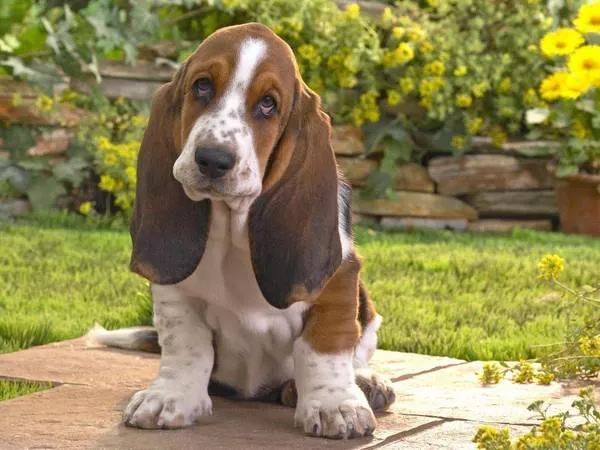Bringing a new puppy into your home is an exciting and joyful experience. However, it’s important to recognize that puppies, including Basset Hounds, go through a teething phase during which they may exhibit biting behavior. While biting is a natural part of their development, it’s essential to teach your Basset Hound puppy appropriate bite inhibition to prevent any accidental injuries or aggressive behavior as they grow older. This article will provide you with a comprehensive guide on how to train a Basset Hound puppy not to bite.
Understanding Basset Hound Behavior
Basset Hounds are renowned for their laid-back and gentle nature. They are loyal, affectionate, and typically get along well with people and other animals. However, like all puppies, Basset Hound puppies explore the world through their mouths and may engage in biting behavior during their teething stage, which usually starts around three to four months of age.
It’s important to differentiate between playful mouthing and aggressive biting. Playful mouthing is usually gentle, with the puppy using minimal pressure and often accompanied by wagging tails and a relaxed body posture. On the other hand, aggressive biting involves more forceful mouthing, growling, stiff body language, and may be accompanied by snapping or lunging.
Training Techniques to Prevent Biting
Socialization: Proper socialization is crucial for puppies to learn appropriate behavior. Expose your Basset Hound puppy to a variety of people, animals, sounds, and environments from an early age. Positive interactions during this critical period will help your puppy become comfortable and confident in different situations, reducing the likelihood of fear-based aggression and biting.
Provide Appropriate Chew Toys: Basset Hound puppies, like all teething puppies, have an innate need to chew. Offer a variety of safe and durable chew toys specifically designed for teething puppies. This will provide them with an outlet for their natural chewing instincts and help redirect their biting behavior to appropriate objects.
Positive Reinforcement: Positive reinforcement is a powerful tool in training your Basset Hound puppy. Reward them with praise, treats, or playtime whenever they exhibit desired behavior, such as licking instead of biting. Consistently rewarding good behavior reinforces the positive association and encourages them to repeat it.
Redirect and Substitute: When your Basset Hound puppy starts to bite, redirect their attention to an appropriate chew toy or interactive puzzle feeder. This substitution technique helps them understand that biting humans is not acceptable while providing an alternative outlet for their chewing needs.
Firmly Say “No” and Withdraw Attention: Use a firm, but not aggressive, vocal command such as “No” or “Ouch” when your puppy bites. Simultaneously, withdraw your attention by crossing your arms, turning away, or leaving the room briefly. This teaches your puppy that biting leads to the removal of attention and playtime, which they naturally desire.
Time-outs: If your Basset Hound puppy persists in biting despite your attempts to redirect and withdraw attention, implement brief time-outs. Create a designated space, such as a playpen or a separate room, where you can place them for a short period (approximately 30 seconds). This will help them understand that biting leads to isolation and lack of interaction.
Consistency and Patience: Training a Basset Hound puppy not to bite requires consistency and patience. Ensure that all family members and visitors follow the same training techniques and avoid rough play that may encourage biting. Remember, puppies learn through repetition, so consistency is key to helping them understand what is expected of them.
Preventing Biting During Handling
Basset Hound puppies, like any dog, need to learn to be comfortable with handling, including grooming, veterinary examinations, and everyday activities. Proper handling training helps prevent biting incidents when they are being touched or restrained. Here are some techniques to help you teach your Basset Hound puppy to be tolerant of handling:
Start Gradually: Begin by gently touching your puppy in non-threatening areas, such as the back or shoulder, while offering treats and praise. Gradually increase the level of touch, including paws, ears, and tail, over several short sessions.
Conditioning with Treats: Associate handling with positive experiences by offering treats during and after each session of handling. This will help your puppy associate touch with rewards and reduce any potential fear or anxiety.
Practice Restraint: Introduce gentle restraint exercises, such as lightly holding your puppy’s collar or briefly cradling them in your arms. Gradually increase the duration of restraint, rewarding your puppy for calm behavior. This will help them become accustomed to being held without feeling threatened.
Grooming Sessions: Introduce grooming tools, such as brushes or nail clippers, gradually, allowing your puppy to sniff and investigate them before attempting to use them. Pair each grooming session with positive reinforcement and treats to create a positive association.
Vet Visits: Schedule regular veterinary visits to ensure your puppy receives essential vaccinations and check-ups. Ask your veterinarian to handle your Basset Hound puppy gently and reward them with treats during and after the examination. This will help your puppy associate the veterinary clinic with positive experiences.
Seeking Professional Help
If your Basset Hound puppy’s biting behavior persists, becomes aggressive, or causes injury, it is important to seek professional help. Consult a qualified dog trainer or a veterinary behaviorist who can assess your puppy’s behavior and provide personalized guidance and training techniques to address the biting issue effectively.
Conclusion
Training a Basset Hound puppy not to bite is an important aspect of responsible pet ownership. By understanding their behavior, implementing positive training techniques, and ensuring proper socialization and handling, you can help your Basset Hound puppy develop appropriate bite inhibition. Consistency, patience, and positive reinforcement are key elements in teaching them to redirect their biting instincts and become well-mannered and gentle adult dogs. Remember, training should always be based on positive reinforcement and never involve harsh punishment or physical force. Enjoy the journey of raising your Basset Hound puppy and building a strong bond based on trust and respect.


